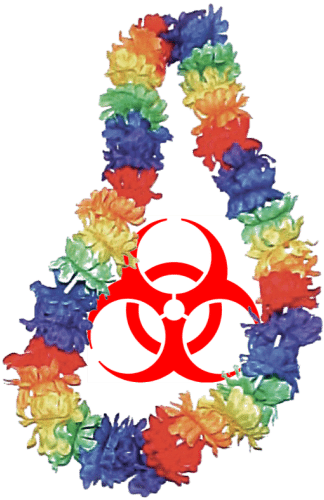Environment
Pesticides: Trouble in Paradise

People vacation on the Hawaiian island of Kaua’i to swim, snorkel and surf. And to unplug. We did. For three weeks. My wife and I also spent one Saturday night at a rally supporting a ballot initiative to control the use of Genetically Modified Organisms (GMOs) and pesticides on the island. Admittedly, not the most touristy thing to do.
Part of the draw was Makana, which means “gift” in Hawaiian, which he surely is. Makana has been hailed as Hawaii’s greatest young slack-key musician and songwriter. You may know him because he wrote a song, “We Are the Many,” that became the anthem of the Occupy Movement. Slack-key, which characterizes Hawaiian music, was the legacy of Mexican cowboys, who came to the island as contract workers over a century ago – the beginning of a long history of workers imported there from other countries.
We were also interested because we had stumbled across the anti-GMO movement while exploring the island a year ago. We found homemade signs thrown up along the sides of the road, at the head of someone’s driveway or in front of houses all around the island. When we drove to the western side, we saw the sprawling experimentation centers run by Monsanto and Syngenta – two of the largest agribusinesses in the world. So we started paying attention.
Over the past year events have been dramatic. Kaua’i has a form of government characteristic of the islands. There’s a “city council” type of organization elected by districts and a “mayor” elected by the whole island. During the past year, this County Council adopted a ban on GMO experimentation on Kaua’i, the mayor vetoed it and the council overrode the veto by a single vote – a lot of political theatrics for such a quiet place. Now community people have proposed an initiative to ban experimentation with GMOs and pesticides unless the companies can prove that these are not harmful to people or the island’s eco-system. They plan to put it on the ballot for this year’s election cycle.
Monsanto and Syngenta experiment with both GMOs and pesticides on Kaua’i. For example Syngenta, a Swiss company, uses poisons such as atrazine, which is banned in Switzerland and the European Union. The company plants samples of GMO crops, apply pesticides and run tests to determine how the GMOs work and whether they could be marketed.
The companies chose Kaua’i because it sits in the middle of the Pacific Ocean, 100 miles from the next closest land, and has a sort of closed environment where nothing can escape too far. The island also has an abundance of vacant agricultural land because over the past decades the sugar cane plantations moved production to lower-wage places like the Philippines, leaving behind acreage that has yet to be repurposed. The move also left large numbers of people desperate for employment – a loss of livelihood that the burgeoning tourist industry has not absorbed. Sounds like the perfect cue for a couple of multinationals.
But at the rally people told more painful stories. A woman who runs a medical clinic on the same west side of the island as Monsanto and Syngenta described clusters of cancer and birth defects that sound more like the town of McFarland in our Central Valley than an island in paradise. She talked about increasing cases of asthma and illnesses that don’t respond to the usual treatment protocols. Others told their personal stories of family illness, debilitation and early death. All of them described their futile efforts to get government agencies to provide oversight or investigate their claims. In fact, the former attorney for Monsanto has just been appointed head of the island’s public health committee.
Still others described the fragile nature of the island: flora vulnerable to escaped GMOs, invasive plants that choke out the natural vegetation, water sources desecrated by poisons. Add to these corporate degradations other evolving problems: disappearance of reefs because of over-use, decreased catches due to commercial over-fishing, a native Hawaiian culture so overwhelmed by the tourist economy that it barely holds on.
Kaua’i faces changes so catastrophic that they could destroy the reasons why people want to vacation there. What Monsanto and Syngenta do could destroy life itself on the island. On the other hand, there are jobs at stake, and people want to work even at great risk to themselves, their families and their homeland. The island faces a crossroad with this election, just as we all face decision-time on our planet. So people push their initiative to reign in the corporations, and the mayor runs for re-election. Things could change, or not. The people of Kaua’i could stop the destruction of paradise. If they do, it will be a remarkable lesson for us all.
-

 Latest NewsApril 10, 2024
Latest NewsApril 10, 2024The Transatlantic Battle to Stop Methane Gas Exports From South Texas
-

 Latest NewsApril 23, 2024
Latest NewsApril 23, 2024A Whole-Person Approach to Combating Homelessness
-

 Latest NewsMarch 27, 2024
Latest NewsMarch 27, 2024Street Artists Say Graffiti on Abandoned L.A. High-Rises Is Disruptive, Divisive Art
-

 State of InequalityApril 11, 2024
State of InequalityApril 11, 2024Dispelling the Stereotypes About California’s Low-Wage Workers
-

 Latest NewsApril 24, 2024
Latest NewsApril 24, 2024An Author Reflects on the Effort to Rebuild L.A. After the ‘Violent Spring’ of 1992
-

 State of InequalityMarch 28, 2024
State of InequalityMarch 28, 2024Los Angeles Hotel Workers Could Use the 2028 Olympics to Their Advantage
-

 Striking BackApril 12, 2024
Striking BackApril 12, 2024Organizing the Slopes
-

 State of InequalityApril 25, 2024
State of InequalityApril 25, 2024California Often Leads Change, but Not for Single-Payer Health Care




















